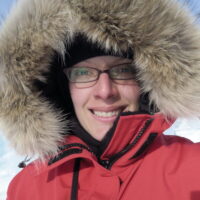Canada Foundation for Innovation Funds Six Innovative Projects at Carleton
Researchers from Carleton University are receiving new funding from the Canada Foundation for Innovation (CFI)’s John R. Evans Leaders Fund (JELF) for six innovative research projects. Projects explore robots supporting the construction industry, to enhancing motion data to eliminate road fatalities, and tracking ancient organisms on Earth.
The JELF recognizes innovative leaders or researchers with great potential for excellence in their field who are engaged in high-quality research development that meets international standards. The fund’s name pays tribute to the outstanding contributions of John R. Evans, the first Chair of the CFI’s Board of Directors.
The awards range from $75,000 to $110,000 to support the labs and equipment needed to advance their innovative research. They also include additional funding through the CFI’s Infrastructure Operating Fund to cover the research infrastructure’s costs.
The infrastructure projects funded by the Government of Canada through the Canada Foundation for Innovation’s John R. Evans Leaders Fund support researchers who are pushing boundaries of knowledge while driving economic prosperity. In the global race for talent, the CFI’s support helps institutions train, attract and retain these talented researchers and ensures all Canadians benefit from their innovations.
– Roseann O’Reilly Runte, President and CEO, Canada Foundation for Innovation
Carleton is proud to share the following researchers who have been awarded funding for their projects:
Allyson Brady, Department of Biology

Project: Identification and quantification of organic molecules from microbial ecosystems
Allyson Brady’s team is investigating microorganisms, the backbone of ecosystems, which play a crucial role in the underlying cycling of carbon and nutrients and represent a wealth of biodiversity. The CFI JELF funding will enable the use of a gas chromatograph mass spectrometer (GC/ MS) to investigate the:
- ability of microbes to break down microplastics in the environment,
- the role they play in producing and consuming methane in oil sands tailings ponds, and
- the cell components microbes make and leave behind in extreme environments (e.g., hot springs) with relevance to astrobiology.
Chris Joslin, School of Information Technology

Co-researchers: Marzieh Amini, School of Information Technology; Jeremy Laliberté, Department of Mechanical and Aerospace Engineering
Project: Advanced Vision Integration for Road Safety (AVIRS)
In alignment with Vision Zero, an international strategy adopted by Canada to eliminate road fatalities, Dr. Joslin’s team is developing the next generation of Driver Assisted Vehicles (DAV) systems and Autonomous Vehicle (AV) systems. Dr. Joslin will gather essential data to develop methods capable of addressing an extended range of road conditions and Canadian driving habits. The CFI JELF funding will support a data collection vehicle, a complimentary flying drone, a LIDAR, and thermal cameras. These vehicles will be outfitted with high-resolution/high-frame rate cameras, radars, and thermal cameras enabling extensive data collection and serving as a platform for field-testing the developed methods.
Christine Davy, Department of Biology

Project: Urban aeroconservation for regionally migrating bats
Bats provide ecosystem services, including control of agricultural and forestry pest insects, and are important to Canadian biodiversity. However, several bat species are endangered due to habitat modification and introduced diseases. Knowledge gaps are limiting our ability to protect them. Christina Davy’s team will construct 50 wildlife tracking stations to collect previously unobtainable data to:
- explore aerial habitats,
- understand how bats adjust to urban environments, and
- test how sociality and migration affect viral transmission.
Dr. Davy’s work will inform Canadian habitat protection and wildlife health policies, including contributing to Canada’s pandemic preparedness and planning for bat-friendly cities.
David Thue and Lesley Istead, School of Information Technology

Project: The Audience Experience Lab: Transforming Digital Media Production for Film and Games
Canada’s video game and film industries contributed about $12 billion to Canada’s economy in 2021, with two aspects of production key to this success: high-quality content and testing with audiences before release. Unfortunately, these activities require significant time and finances. David Thue and Lesley Istead aim to prototype AI tools to predict the effects of a film or game on its audience and reduce the need for testing by studying:
- the influence of film and game language on audience understanding and enjoyment, and
- how Artificial Intelligence (AI) can improve film and game production.
Peter Crockford, Department of Earth Sciences

Project: Sulfate Through Time
Despite numerous investigations into the Earth’s past, considerable uncertainty remains surrounding many aspects of Earth. Dr. Crockford’s team is investigating a critical property of our oceans that has historically been a challenge to constrain—sulfate in seawater. Dissolved sulfate plays a critical role in regulating methane emissions in the ocean and breaks down organic matter that settles on the ocean floor. With the CFI JELF support, Dr. Crockford will implement new infrastructure, such as an ICP-MS, to constrain sulfate levels through time as well as other biogeochemical cycles.
Sheryl Boyle, Azrieli School of Architecture & Urbanism

Co-researchers: Robin Chhabra, Department of Mechanical & Aerospace Engineering; Stephen Fai, Azrieli School of Architecture & Urbanism
Project: Accessible Automated Construction Site Studio (AACeSS Lab)
To advance the use of robotics in the construction industry and the reuse of existing buildings, Sheryl Boyle’s team will use industrial robots to manipulate and assemble building components. These collaborative robots (cobots) will help expand the skilled trades sector beyond limits defined by human strength. The AACeSS lab will employ robotics and machine learning to work towards introducing safe and intelligent autonomy in the construction industry. Dr. Boyle will capture robotic interactions with building components and their environments to solve the challenge of using robots for non-repetitive building tasks and educate Canada’s workforce on the transition to a digital working environment.